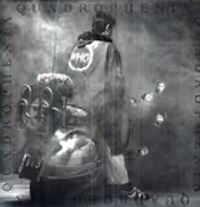Is a white person playing a role "of color"* considered racist?
#76Is a white person playing a role
Posted: 11/30/12 at 5:39pm
The point Phyllis is making is that many opera houses (including the ROH) are eschewing blackface makeup when white singers perform roles like Otello or Aida. The Met should consider doing the same, if for no other reason than the bronzer and "ethnic" wig they put on their white Aidas looks more Teresa Giudice than Nubian princess.
And I most emphatically agree with Phyllis (which happens a lot more than she seems to realize or wants to acknowledge). I'm sorry if my agreement got lost in the exchange.
And I'll add that few if any of us care what Kiri Te Kanawa sings (or sang in her heyday). I think we were happy to let her play any race or ethnicity she chose.
#77Is a white person playing a role
Posted: 11/30/12 at 5:44pm
There's a huge difference between performing a character of another race (or gender, or religion, or whatever) seriously, or as caricature. It seems that most people today are unable to recognize that difference. Being outraged is so much more fun than thinking.
There is a difference, newintown, but when we get to the professional theater there is also the issue that all actors are struggling to earn a living in a difficult business. Since so many characters (professionals, neighbors, extras, etc.) are unfairly assumed to be white, actors of color start at a greater disadvantage.
No matter how serious the portrayal of an African-American character, casting a white actor still takes away one of the few jobs open to black actors. (Raul Julia once made a credible Othello, but I doubt he would be cast today.)
#78Is a white person playing a role
Posted: 11/30/12 at 5:48pm
Depending on which act of Butterfly the photos are from it may not be "yellow face." If her face appears lighter than the rest of her skin it may just be that she was doing an approximation of the full on geisha make up with the very white foundation.
Thanks, AEA. It didn't appear to be full-on geisha make-up, but neither was the photo captioned. So at this point I'm not at all sure it was a production shot from BUTTERFLY; it could have come some something else.
ETA Never mind. Pal Joey found a better photo and posted it above. It is indeed an approximation of "geisha" make-up.
Updated On: 11/30/12 at 05:48 PM
#79Is a white person playing a role
Posted: 11/30/12 at 5:51pmWell put, Gaveston. I completely agree--and I do think the OP's question plays into the whole thing--I don't think it does create a problem in school (and community) productions, within some reason. BTW Phyllis would prob hate me saying this but I agree with him (her?) more often than not, and I think both of you have a lot of great things to add to this forum, so I wouldn't be so quick to think he doesn't agree with you. (She? I'm so confused.)
#80Is a white person playing a role
Posted: 11/30/12 at 5:53pm
Joey, thanks so much for the productions shots. I know BUTTERFLY is a warhorse, but I still think it's one of the best librettos (and scores) in the repertoire.
And an African-American Pinkerton is sheer genius! It adds an entirely new level to what is already a rich play.
Updated On: 11/30/12 at 05:53 PM
#81Is a white person playing a role
Posted: 11/30/12 at 5:58pm
(Price) kinda did it in whiteface.
That must be the geisha make-up that AC was talking about. I can't remember all the rules that applied to geishas in different periods, but for a Western audience that wouldn't know the difference, that seems an elegant solution.
I really think the photo I was discussing was mislabeled.
#82Is a white person playing a role
Posted: 11/30/12 at 6:02pm
BTW Phyllis would prob hate me saying this but I agree with him (her?) more often than not, and I think both of you have a lot of great things to add to this forum, so I wouldn't be so quick to think he doesn't agree with you. (She? I'm so confused.)
I only meant (facetiously) that Phyllis may not like to ADMIT she and I agree as often as we do: which is, frankly, almost all the time.
#83Is a white person playing a role
Posted: 12/1/12 at 8:42am
"And an African-American Pinkerton is sheer genius! It adds an entirely new level to what is already a rich play."
So now I am confused. This idea was in an earlier post complete with pictures and was referred to as "color blind casting". I thought color blind casting refers to the idea that race makes absolutely no difference to the story or the casting. Yet, you are saying that casting an African American in the role dramatically changes the entire play. Is that then really "color blind casting"?
#84Is a white person playing a role
Posted: 12/1/12 at 9:13am
1) Racism is not dependent on intent. In a lot of ways, it's equally important to address accidental, unintentional racism that comes from thoughtlessness or mild, internalized racism. This is always the argument that comes up when people make a racist (or sexist, or homophobic, etc.) joke and get mad at people for being offended. "Well I didn't INTEND it to be offensive!" Life doesn't work like that. People are responsible for their words and actions, no matter the initial intent.
2) There is a huge difference between skin color and something like hair color, eye color, etc. Saying that you "don't notice" skin color or don't think it should be considered any more important than any other feature just indicates a general ignorance of why race is a topic that has to be handled with such thoughtfulness. There aren't major histories of prejudice, exclusion, marginalization, etc., based on hair color. In theatre, pretty much ALL THE ROLES EVER are considered "white," even when there's no specific reason they need to be. White people do not have trouble fitting into this industry. This is why we should be protective of roles written for minorities.
#85Is a white person playing a role
Posted: 12/1/12 at 9:29am
If there is no one fat who auditions to play a fat role, they pad him. If no old man auditions for an old man play, they make him up for the role. If there is no one who is blind to play Helen in The Miracle Worker, they "pretend". It's kind of sad that people make skin color a bigger issue than any other physical difference.
Except for the fact that putting someone white in makeup to play a role that was intended for a person of color has very different ramifications and history than putting someone in a fat suit or age makeup. And pretending those things don't exist just makes you willfully ignorant.
Also holy crap, racism is not dependent on intent and I don't care how "tastefully" or convincingly it is done, blackface is still blackface.
#86Is a white person playing a role
Posted: 12/1/12 at 1:11pm
So now I am confused. This idea was in an earlier post complete with pictures and was referred to as "color blind casting". I thought color blind casting refers to the idea that race makes absolutely no difference to the story or the casting. Yet, you are saying that casting an African American in the role dramatically changes the entire play. Is that then really "color blind casting"?
The term "color blind casting" usually refers to the intention of those who make the decision. As a viewer, I'm entitled to see meaning in the choice, whether it was intended or not.
Now maybe those who cast a black Pinkerton wanted to make a statement about internalized imperialist attitudes, but I think it's more likely they just cast the best tenor for the role. I, on the other hand, like the notion that imperialism is a human impulse, not just a Caucasian one.
Does that make sense?
#87Is a white person playing a role
Posted: 12/1/12 at 1:21pm
Racism is not dependent on intent.
But isn't that just an inadequacy of the English language? Surely there's a difference between using a politically incorrect expression out of ignorance and actually believing that people with a certain skin color all have the same abilities and attributes (or lack thereof).
I'm not saying results don't matter. They do, of course. But inexperience is not the same as outright hatred.
#88Is a white person playing a role
Posted: 12/1/12 at 2:33pmI wonder if any of the Americans who care so much about race in theatre casting care if Western characters in theatrical productions in China are cast with Western actors. Or if Asian characters in productions of plays in Ghana are portrayed by Asian actors. I would imagine not - we're so focused on American white racism, we forget (don't much care) that there's the rest of the world.
Phyllis Rogers Stone
Broadway Legend Joined: 9/16/07
#89Is a white person playing a role
Posted: 12/1/12 at 2:54pmI agree. Hypothetical racism in China is what we should REALLY be focusing on!
#90Is a white person playing a role
Posted: 12/1/12 at 3:00pm
I have an African-American friend who is married to an Australian director. He works all the time Down Under. He usually plays drug dealers and other street thugs, but he works.
As for Asian-Americans trying to work in their own country, I'm not sure why the entire world is their problem.
#91Is a white person playing a role
Posted: 12/1/12 at 3:15pmThank you for helping to prove my point.
#92Is a white person playing a role
Posted: 12/1/12 at 3:36pmOdd. I didn't see a point. I saw an attempt at a snide comment.
#93Is a white person playing a role
Posted: 12/1/12 at 3:54pmWhile I'm not quite sure what "their own country" would mean to most Asian-*Americans* (I wish we could just get to the point where everyone was described as American), I think Gaveston makes a great point. In terms of racial casting I think context (meaning both the play's context, and geographic locations) mean a great deal.
#94Is a white person playing a role
Posted: 12/1/12 at 4:09pm
Good God, I hope it was clear that by Asian-Americans' "own country" I meant the USA, just as I would for African-Americans, European-Americans, etc.!
And, yes, Eric's right: geography matters, as does history. We are having this conversation because the USA has a history of segregation in casting, one in which white people played all ethnicities in various, ridiculous get-ups.
I don't know that China has a history of excluding Caucasians from its national theater. Given the number of years it takes to master Chinese opera, I doubt there were a lot of European applicants.
#95Is a white person playing a role
Posted: 12/1/12 at 4:19pm
Sorry Gaveston--I completely missed your point (which on re-reading seems clear.)
I think largely, colour blind casting makes sense (and, excepting the history of caucasians playing other races, it seems something that Americans have more issue with than other countries.) When a play or musical specifically deals with race, it becomes a different issue.
#96Is a white person playing a role
Posted: 12/1/12 at 4:38pm
Thank you, Eric. I'd be mortified if readers thought I meant the opposite, so I appreciate the clarification.
Almost ALL "American" culture is appropriated from somewhere, so it stands to reason we'd have some conflict over it. I for one see nothing wrong with these discussions.
#97Is a white person playing a role
Posted: 12/1/12 at 4:39pm
> We are having this conversation because the USA has a history of segregation in casting, one in which white people played all ethnicities in various, ridiculous get-ups.
Related to that point, there are two good documentary films that look at Hollywood's portrayals of Chinese people and Native Americans, sometimes played by non-Chinese and non-Native American actors:
Hollywood Chinese: http://www.deepfocusproductions.com/HollywoodChinese/
Reel Injun:
http://www.reelinjunthemovie.com/site/
#98Is a white person playing a role
Posted: 12/1/12 at 5:03pm
But isn't that just an inadequacy of the English language? Surely there's a difference between using a politically incorrect expression out of ignorance and actually believing that people with a certain skin color all have the same abilities and attributes (or lack thereof).
I think it's moreso a lack of appreciation for the vast range of subtleties that racism can include. Everyone can recognize overt, hostile hatred of other races. It's harder to recognize its subtler forms.
And let's be clear: people can make inadvertently racist comments without actually being racists. The difference is whether they can be called out on it and go, oh, I understand, or whether they make excuses for it.
#99Is a white person playing a role
Posted: 12/1/12 at 5:04pm
Double post. ![]() Updated On: 12/1/12 at 05:04 PM
Updated On: 12/1/12 at 05:04 PM
Videos









